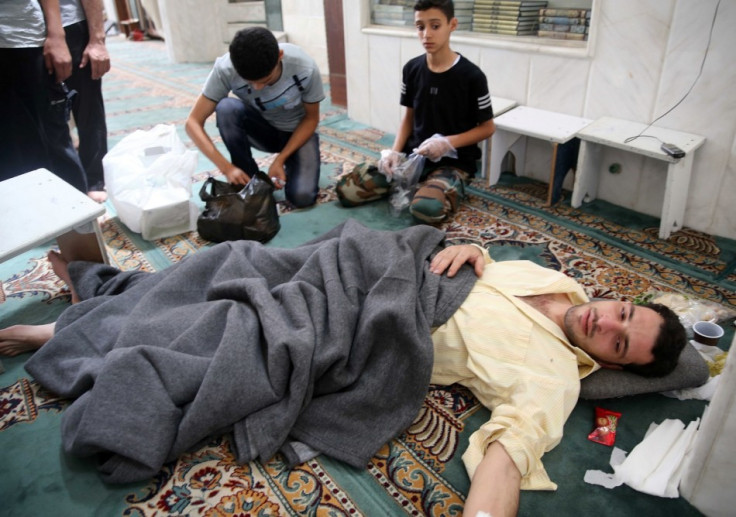Ghouta Gas Attack: Syria and Hezbollah Threaten Reprisals Against Israel if West Attacks [VIDEO]
Russia says Western military intervention against Assad will lead to long-term destabilisation in Middle East

US and Britain's plan to take military action to punish the Syrian regime for the Ghouta poison gas attack have raised fears that the attack could ignite a tit-for-tat escalation of violence across the tinderbox Middle East.
Syria has threatened to retaliate against Israel if a large-scale military intervention against the government of Bashar al-Assad is undertaken.
"If Damascus comes under attack, Tel Aviv will be targeted and a full-scale war against Syria will actually issue a licence for attacking Israel," a senior Syrian army source told Iran's Fars News Agency.
"If Syria is attacked, Israel will also be set on fire and such an attack will, in turn, engage Syria's neighbours," he added.
Israel vowed to strike back. "We are not part of the civil war in Syria, but if we identify any attempt whatsoever to harm us, we will respond with great force," prime minister Benjamin Netanyahu said.
Lebanese militant group Hezbollah, which is fighting Syrian rebels alongside Assad troops, also aired the possibility to hit Israel in response to US military intervention.
"A large-scale Western strike on Syria will plunge Lebanon virtually and immediately into the inferno of a war with Israel," a senior source close to Hezbollah told Lebanese the Daily Star newspaper.
However, the source said Hezbollah, which had a history of launching rockets across Lebanon's Israeli border, will not retaliate if the Western attack was limited to certain targets, a tactic the US and Britain plan to adopt.
Prime Minister David Cameron said Britain had no intention to get involved in a Middle East war, but any action taken will be limited to containing Assad's chemical weapons capabilities and deterring its future use.
"This is not about wars in the Middle East. This is not even about the Syrian conflict. It is about the use of chemical weapons and making sure, as a world, we deter their use and we deter the appalling scenes that we've all seen on our television screens," Cameron said.
Nevertheless Russia, which has long backed Assad on the international stage, repeatedly vetoing attempts to pass tougher UN resolutions warned any kind of intervention will lead to regional turmoil.
Foreign Minister Sergey Lavrov said armed intervention considered by the US and its allies "will lead to the long-term destabilisation of the situation in the country and the region".
Earlier this week, a senior Iranian politician warned Israel could be dragged into the conflict.
"The Zionist regime will be the first victim of a military attack on Syria," said Hossein Sheikholeslam, the Iranian parliament's director-general for international affairs.
Meanwhile Moscow has also started evacuating its citizens from Syria, where thousands of Russians live and do business.
Activists say more than 1,000 people were killed in the 21 August attack in the Damascus suburb of Ghouta. Doctors Without Borders have put the death toll at 355.
Opposition rebels and the government have continued to blame each other for the massacre. UN inspectors have resumed their investigation to assess whether chemical weapons were used.
READ:
Syria Ghouta Gas Attack: Obama 'Not Seeking Regime Change'
Syria Ghouta Gas Attack: West is Monkey with a Grenade, Says Russia [VIDEO]
Syria: US Asks Greece for Military Base Access
Ghouta Syria Gas Attack: David Cameron Recalls Parliament on Twitter
Ghouta Massacre: Syria will Become 'Another Vietnam' if West Attacks [VIDEO]
Syria Opposition Calls Off Geneva Peace Talks as Russia Warns US Over Strike
© Copyright IBTimes 2025. All rights reserved.






















